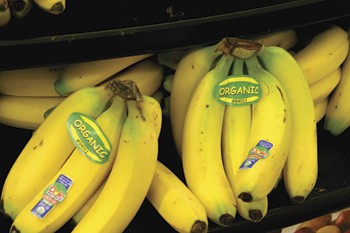
Consumers can purchase organic foods at local stores. (Brennen Cage)
A redhead with one blue eye and one brown eye looks carefully through her glasses as she shops at Whole Foods on Lower Greenville in Dallas. Debra Neel adopted an organic lifestyle six years ago and said she now eats a diet that is 90 percent organic.
“Just the preservatives and growth hormones, genetically-altered foods, I wanted to get away from that,” Neel said.
As organic foods have grown in popularity, it seems every grocery store stocks a supply of the products. But organic foods often cost more money, and health benefits are often hard to determine.
“There are not any definitive studies about organic food being more nutritious. A lot of people in the organic industry like to claim it is,” said Steve Bridges, executive director of the nonprofit Texas Organic Farmers and Gardeners Association.
Bridges says freshness is the most important factor for nutritious produce.
“Local has become equally if not more important than organic for people who are looking for better food,” he said. “So local is almost the new organic.”
The Organic Consumers Association defines organic foods as those grown without the use of synthetic chemicals. According to Environmental Working Group, a nonprofit organization headquartered in Washington, D.C., even a small amount of pesticides can be harmful, especially to consumers in fetal development and childhood.
Bridges says organic agriculture is important for the soil and the environment, too.
“It keeps the poisons out of the environment, and it helps reduce green house warming by incorporating the carbon back into the soil,” he said.
Bridges says big companies like Wal-Mart are capitalizing on the word organic, using it as a catchphrase and marketing tool to attract customers. In the past several years, he says, the organic industry has grown 20 percent.
So why are organic foods more expensive?
According to the Organic Consumers Association, organic goods cost about 15 percent more than non-organic, or conventional, goods.
“It’s more expensive because it’s the true cost of producing food,” Bridges said.
Bridges says the United States Department of Agriculture subsidizes crops such as corn, wheat, soy and cotton. While the farmers of these crops may not break even, government subsidies ensure they are compensated for money lost. However, organic and conventional fruit and vegetable growers do not receive these benefits, so they have to charge more for their products to make a living.
The expense doesn’t make a difference for some. A recent study in the journal Food Policy suggests people are willing to pay expensive prices for organic foods, even if they are not 100 percent organic.
Many consumers purchase the organic versions of only certain foods.
Tim Allen, a husband and father of two, said he has eaten a mixed diet of organic and conventional foods for 10 years after hearing reports that preservatives may cause certain cancers. He buys organic milk for his 18-month-old son.
“We think it’s important not to load him up with the chemicals in other milk,” said Allen, who was shopping one day recently at the Whole Foods on Greenville.
SMU alumnus and Dallas resident Justin Montgomery consumes mostly conventional foods, but he has bought organic milk ever since he saw a documentary that showed the bovine growth hormone causing infections in cow udders. He said the infection caused puss to seep into milk sold to consumers.
“I don’t want any cow puss in my milk,” he said.
Environmental Working Group posted a list on its Web site of the contamination levels of 43 types of produce, and the top 12 most contaminated fruits and vegetables are peaches, apples, sweet bell peppers, celery, nectarines, strawberries, cherries, pears, imported grapes, spinach, lettuce and potatoes. Onions, avocado, sweet corn, pineapples and mangos contained the least number of pesticides, so it would be safer to eat the non-organic versions of these foods.
Neel hopes that one day organic foods will no longer be what she considers a fad for the rich, but a lifestyle for people of all incomes.
“I keep thinking if more and more people go organic, the cost will go down,” she said.
Bridges says conventional farming has only been in existence for 60 years while organic farming has been around forever. Organic foods remind Allen of his lifestyle growing up.
“I was brought up that way. Mom tried to get me on board to live healthier,” Allen said.
While Neel said her diet is now mostly organic vegetables, meat, eggs and milk, she still is tempted by conventional food.
“I still have to have my M&Ms,” Neel said.








